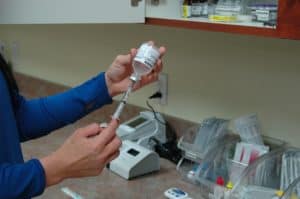Last Updated on August 13, 2023 by The Health Master
Osteoporosis
Osteoporosis is a medical condition characterized by weakened bones that are more susceptible to fractures and breaks.
It occurs when the body loses bone mass and density, leading to a decrease in the structural integrity of the bones.
This condition is most common in older adults, especially postmenopausal women, but it can affect people of all ages and genders.
Bone is a dynamic tissue that undergoes a constant process of remodeling, where old bone is broken down and replaced with new bone.
Osteoporosis occurs when this balance is disrupted, and the rate of bone breakdown exceeds the rate of bone formation.
As a result, bones become fragile and prone to fractures, even with minor stress or trauma.
Risk factors for osteoporosis include:
- Age: The risk increases as you get older.
- Gender: Women are more susceptible, especially after menopause, due to hormonal changes.
- Hormonal changes: Low levels of estrogen in women and low levels of testosterone in men can contribute to bone loss.
- Family history: A family history of osteoporosis can increase the risk.
- Low calcium and vitamin D intake: These nutrients are essential for bone health.
- Inactive lifestyle: Lack of physical activity can lead to bone loss.
- Smoking and excessive alcohol consumption: These habits can weaken bones.
- Certain medical conditions and medications: Conditions like hyperthyroidism, celiac disease, and some medications like glucocorticoids can contribute to bone loss.
The diagnosis of osteoporosis is often done through bone density tests like dual-energy X-ray absorptiometry (DXA) scans.
These tests measure the density of bones, usually in the spine, hip, and wrist, and help determine the risk of fractures.
Prevention and management of osteoporosis include:
- Adequate calcium and vitamin D intake through diet or supplements.
- Regular weight-bearing and muscle-strengthening exercises.
- Avoiding smoking and excessive alcohol consumption.
- Medications: Doctors may prescribe medications that slow down bone breakdown or stimulate bone formation.
It’s important to consult a healthcare professional if you suspect you might have osteoporosis or if you have any risk factors.
They can recommend appropriate measures to manage the condition and reduce the risk of fractures.
Disclaimer: This content, including advice, provides generic information only. It is in no way a substitute for a qualified medical opinion. Always consult a specialist or your own doctor for more information. The Health Master does not claim responsibility for this information.
Preventing dental and gum issues due to Pyorrhea – Expert Tips
Control Weight and Detoxify Your Body with These 3 Drinks
Steroids के ज्यादा उपयोग के कुछ प्रमुख दुशपरिणाम: Must read
Sleepwalking: What is it and its Symptoms
Busting Weight Loss Myths: Facts vs. Fiction
Uric Acid: What to eat and what to avoid if it’s rising
7 Tips: Healthy skin बनाये रखने के लिए क्या करे पुरुष
डॉक्टर के साथ ऑनलाइन परामर्श के लिए टिप्स
Foods to Naturally Thin the Blood
6 Amazing benefits of Ginger: From cancer prevention to weight loss










